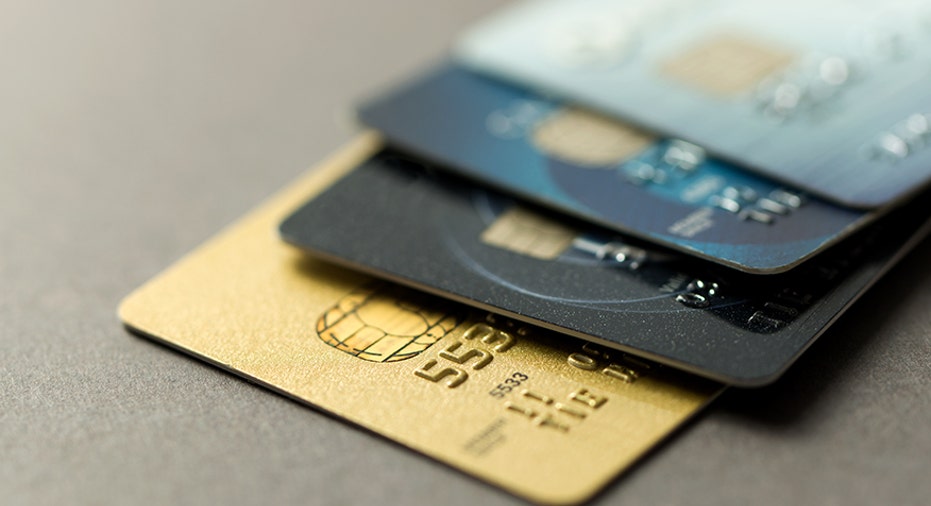Americans prefer debit cards to credit cards, here's why that's a mistake

Americans certainly aren't strangers to credit cards. The average household owes $5,700 in credit card debt, but for some borrowers, that figure is significantly higher.
Despite our collective reliance on credit cards, it seems that consumers tend to favor debit cards on the whole. In a new NerdWallet study, 44% of Americans say they mostly use debit cards for daily purchases like food and fuel. By contrast, only 34% primarily pay by credit card.
Why do so many folks prefer debit cards? For one thing, it's easier to avoid debt when you're using a debit card: Once you run out of funds in the bank account it's linked to, you won't have the option to keep on swiping. Credit cards, by contrast, open the door to temptation by offering limits that are higher than what many Americans can actually afford to hit. In fact, of those who say they use their debit cards more regularly, 71% have grappled with credit card debt in the past.
Still, there are certain benefits to using a credit card that debit cards just can't match. Here are a few to consider.
1. Credit cards can help boost your credit score
When used incorrectly, a credit card can be a very dangerous thing. But when utilized responsibly, a credit card can be an efficient tool for building credit. When you charge items on a credit card and then pay your bills on time and in full, you establish a solid payment history, which is the single most important factor in determining your credit score. Debit cards, by contrast, don't help you build credit -- even though 24% of Americans mistakenly believe they do.
2. Credit cards offer rewards
When you use a credit card for purchases, you'll typically earn rewards in the form of cash back. In some cases, you might even earn double or triple rewards for certain purchase categories, like gas or restaurant meals. So if, for example, your credit card offers 2% cash back on fuel, and you spend $3,000 a year on gasoline for your car, you'll get $60 for buying what's clearly a necessity. Debit cards, on the other hand, don't offer cash back on your purchases, so using one regularly could mean missing out on free money, which many of us need.
3. Credit cards offer purchase protection
Many credit cards offer built-in purchase protection, which means you're covered in the event something you buy is lost, damaged, or stolen. While debit cards do serve as a record of your transactions, they typically don't offer that same level of reassurance by covering actual losses. Additionally, a number of credit cards offer price rewind programs, so that if you buy something using a credit card and find the same item at a lower price within a certain timeframe (typically 30 or 60 days), you'll be automatically refunded the difference. That's unlikely to happen with a debit card.
When to stick to that debit card
Though credit cards offer several benefits that debit cards don't, in some cases, it does pay to consistently use a debit card over a credit card. For example, if you have a history of maxing out your credit limit or using your credit card recklessly, it might pay to stick to a debit card and forgo those rewards in order to lower your chances of overspending. Furthermore, if you need to withdraw cash from an ATM, you're almost always better off using a debit card over a credit card.
Finally, some folks just aren't comfortable using credit cards, to the point where it actually serves as a source of stress. According to NerdWallet, almost 25% of consumers experience actual anxiety when using credit cards. If you're one of them, the aforementioned benefits aren't worth harming your mental health.
On the other hand, if you're the type who's responsible with money, and you're aware of how much you can afford to charge, you're better off relying on your credit card for the most part and using your debit card sparingly. When utilized wisely, credit cards are a valuable financial tool, so you might as well make the most of having one.
5 Simple Tips to Skyrocket Your Credit Score Over 800!Increasing your credit score above 800 will put you in rare company. So rare that only 1 in 9 Americans can claim they're members of this elite club. But contrary to popular belief, racking up a high credit score is a lot easier than you may have imagined following 5 simple, disciplined strategies. You'll find a full rundown of each inside our FREE credit score guide. It's time to put your financial future first and secure a lifetime of savings by increasing your credit score. Simply click here to claim a copy 5 Simple Tips to Skyrocket Your Credit Score over 800.
The Motley Fool has a disclosure policy.



















